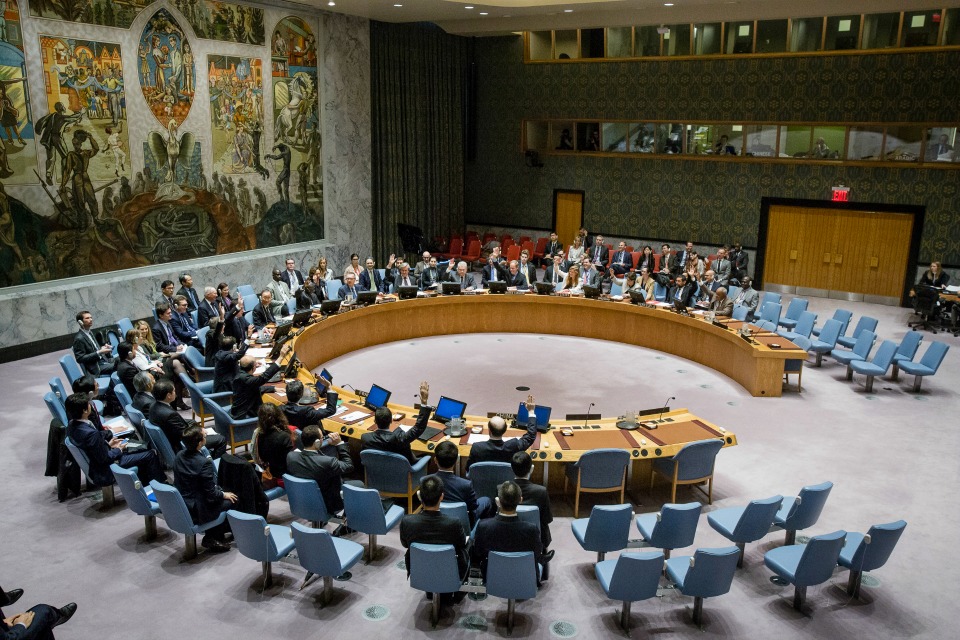"Forced labour in the DPRK is a travesty, a tragedy, one that has led to the deaths of hundreds of thousands of North Koreans."
Statement by Ambassador Matthew Rycroft, UK Permanent Representative to the United Nations, at the UN Security Council meeting on DPRK human rights

Thank you Mr President.
At the outset, let me welcome Jan and Andrew back to the Council and I thank them for their briefings. Jan, in case this is my final opportunity in this Chamber, allow me also to commend you and congratulate you personally for everything that you have done through your distinguished career on human rights and other aspects of the UN Charter.
We have heard some members argue today that we shouldn’t be focusing on human rights in the DPRK. That this isn’t a matter for the Council. And I have to respectfully disagree.
When a regime chooses to spend its resources on reckless nuclear policies, and not on its people, peace and security is threatened. When a state violates the sovereignty of its neighbours and abducts their citizens, regional stability is jeopardised. And when a regime shuts off its people from the world, denies them their most basic rights, the UN Charter is ignored.
So, Mr President, it is entirely right that we’re holding this session today. Human rights violations are like the canary in the coal mine, warning us of threats to international peace and security.
I want to focus my statement this morning on a very specific human rights concern in the DPRK; the use of forced labour. The word ‘concern’ doesn’t do this issue justice. Forced labour in the DPRK is a travesty, a tragedy, one that has led to the deaths of hundreds of thousands of North Koreans.
In truth, my words can’t convey the horror, so let me use those of Hyuk Kim, who was held in the Jungeori Labour Camp.
He said, and I quote, “At Jungeori, there was no sense of being human … You do the labour you were ordered to do … No thinking. No free will. Just fear”, end of quote. His testimony speaks of unimaginable hunger and cruelty. He would supplement his meagre diet with rats, eaten raw because, and I quote, “If you tried to cook the rats, the guards would smell the meat or fire, catch you and beat you mercilessly”. End of quote.
Such cruelty has been experienced by so many North Koreans. And that cruelty has served only one purpose; to generate income for the regime, income that it has chosen to spend on its illicit nuclear and ballistic missile programmes in violation of so many resolutions of this Council.
But this is only one part of the story, Mr President. Beyond North Korea’s borders, there lies another travesty, another tragedy. It’s the tragedy of tens of thousands of North Koreans forced to work abroad to raise money for the regime in circumvention of UN sanctions.
It’s estimated that this practice raises as much as $2 billion in foreign currency each year. That money is made by putting North Koreans to work in unscrupulous mines, factories and construction sites, often at great risk and often without any protection.
For those workers, being abroad offers no escape from the cruelty I described earlier. They live their lives under constant surveillance by their gang masters, to whom they lose most of their meagre pay. They work up to 20 hour days without sufficient food. They are forcibly separated from their loved ones, unsure when or whether they will see them again.
We should call this what it really is. Whether inside or outside the DPRK, this is modern slavery. The UK Government is committed to ridding the world of this scourge. It’s a personal priority of British Prime Minister Theresa May and the UK is galvanising international efforts to bring an end to modern slavery globally.
We cannot underestimate the scale of the challenge in the DPRK. The regime has to date refused to engage in any meaningful dialogue with the international community on human rights. The Special Rapporteur and international observers are still denied full and unhindered access to DPRK. And the previous Foreign Minister said in March that the DPRK would no longer participate in international discussions on this issue.
This is a shameful rejection of the international norms and principles that underpin the UN Universal Declaration of Human Rights. It’s also a rejection of the views of the majority of UN members. Over a hundred countries spoke loudly and clearly when the UN’s Third Committee passed a resolution calling on the DPRK to respect the rights of its people.
So today let us all urge the DPRK to re-engage with the international community and start a process of dialogue, one that leads to credible, concrete steps to improve the human rights of its own people.
The UK believes in this dialogue. It’s why we continue to have diplomatic relations, it’s why we build people to people links through sponsorship of education and humanitarian projects. Moreover, it’s why our Embassy in Pyongyang will continue to deliver strong messages on human rights, directly to the regime. We will not let up in our efforts to convey the international community’s concerns. We urge the DPRK government to take action. This Council must follow suit.
Thank you Mr President.